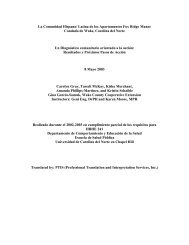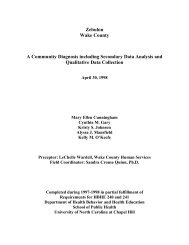The Health bulletin [serial] - University of North Carolina at Chapel Hill
The Health bulletin [serial] - University of North Carolina at Chapel Hill
The Health bulletin [serial] - University of North Carolina at Chapel Hill
Create successful ePaper yourself
Turn your PDF publications into a flip-book with our unique Google optimized e-Paper software.
I<br />
October, 1927 <strong>The</strong> <strong>Health</strong> Bulleti]:^ 19<br />
she not choose the better way Because<br />
she "got a kick out <strong>of</strong> showing<br />
him <strong>of</strong>f to the crowd." Th<strong>at</strong> was her<br />
fun, not his.<br />
Dictum 3<br />
When ice give a child something to<br />
do th<strong>at</strong> is heyond his capacity we<br />
hinder his progress.<br />
Why We fail to give him work th<strong>at</strong><br />
he can do th<strong>at</strong> will help him develop.<br />
Invariably, as a result, he will "kill<br />
time'' and turn away from his job. He<br />
will get the habit <strong>of</strong> "killing time"<br />
when any job comes along, or he will<br />
look for a "boost" to make up for the<br />
disappointment born <strong>of</strong> failure to do<br />
the original task. <strong>The</strong>se "boosts" are<br />
usually had by taking unfair advantage<br />
<strong>of</strong> others.<br />
Example : John was an average boy<br />
but his mother got a thrill out <strong>of</strong> thinking<br />
him a budding genius. She made<br />
special efforts to get him advanced in<br />
school. Against the advice <strong>of</strong> his<br />
teacher he skipped his grade because<br />
his f<strong>at</strong>her had "pull." John could not<br />
carry the new work. In each class he<br />
arrived <strong>at</strong> the end <strong>of</strong> his rope in a<br />
short time. He developed the habit <strong>of</strong><br />
loafing and fooling away his time. It<br />
annoyed others in the class. He realized<br />
he was failing and made up for it<br />
by che<strong>at</strong>ing. Why did John's mother<br />
want him to do the next grade Why<br />
would she not recognize him as just<br />
an average boy For the same reason<br />
th<strong>at</strong> she had to "show him <strong>of</strong>f" when<br />
company came Was it for John or<br />
herself Certainly not for John. Don't<br />
be ashamed <strong>of</strong> your child's capacity. If<br />
he has the capacity to be a taxi driver<br />
r<strong>at</strong>her than a college president, <strong>at</strong> least<br />
make him a good taxi driver. If he is<br />
driven to the impossible ambition <strong>of</strong><br />
becoming a college president he will<br />
have nothing to depend on and will<br />
likely become your permanent boarder<br />
or an unhappy misfit in wh<strong>at</strong>ever job<br />
he gets.<br />
Dictum 4<br />
Whenever ice handk a proilem <strong>of</strong><br />
childhood according to the impulse <strong>of</strong><br />
the moment, we are apt to do so in a<br />
way th<strong>at</strong> is err<strong>at</strong>ic, inconsistent and<br />
destructive <strong>of</strong> the morale <strong>of</strong> the child.<br />
Why <strong>The</strong> child is not just a basketful<br />
<strong>of</strong> behavior, or a series <strong>of</strong> separ<strong>at</strong>e<br />
and unrel<strong>at</strong>ed actions, different on different<br />
occasions. His way <strong>of</strong> behaving<br />
is closely linked up with him and his<br />
make-up. It follows the p<strong>at</strong>tern <strong>of</strong> his<br />
personality consistently and closely.<br />
When we are inconsistent with him we<br />
are throwing a monkey wrench into his<br />
machinery. It is like pouring grapes<br />
into a cotton gin and expecting good<br />
grape juice to come out. We must have<br />
a basic philosophy, a fundamental life<br />
aim, and a sound knowledge <strong>of</strong> the<br />
child's potentialities. We must establish<br />
a policy and stick to it until it proves<br />
itself inadequ<strong>at</strong>e. When we change our<br />
policy our reasons for the change must<br />
be made clear to the child ; otherwise<br />
our mand<strong>at</strong>es will vary with our moods<br />
and fickle desires, to his detriment and<br />
our own regret.<br />
Example: John's mother ruled th<strong>at</strong><br />
he must not get up from the table during<br />
a meal unless necessary, in w-hich<br />
case he must ask her. But five times<br />
out <strong>of</strong> six, when he disregarded the<br />
rule, she said nothing about it, making<br />
a gre<strong>at</strong> uproar the sixth time only because<br />
he broke a dish or spilled the<br />
beans. John never knew where he<br />
stood. To John the kitchen stove was<br />
more sensible; since the first warning<br />
<strong>of</strong> its burning flame, th<strong>at</strong> fixtures had<br />
had a perfect understanding with the<br />
boy, and he respected it. When he<br />
wanted to do something which involved<br />
the danger <strong>of</strong> burns from the stove, he<br />
did not hesit<strong>at</strong>e, or question the stove,<br />
or wonder wh<strong>at</strong> mood it was in, or<br />
stop to see if the stove were looking,<br />
nor did he become emotionally upset or<br />
sullen. He proceeded cautiously to gain<br />
his end without disrespect for the<br />
qualities <strong>of</strong> the stove.<br />
Dictum 5<br />
Whenever our idea <strong>of</strong> good or bad<br />
hehavior is determined iy wh<strong>at</strong> annoys<br />
us and "gets on our nerves," we<br />
are uselessly training the child to conform<br />
to our own life-p<strong>at</strong>tern.<br />
Why Such training will be as<br />
valuable as a leaden quarter to him<br />
l<strong>at</strong>er. Wh<strong>at</strong> annoys us is, in truth,<br />
<strong>of</strong>ten the thing th<strong>at</strong> reveals and proceeds<br />
from weaknesses and twists in<br />
our own character. If we train the<br />
child merely to suit us we <strong>of</strong>ten model<br />
him after a warped p<strong>at</strong>tern. In adult


![The Health bulletin [serial] - University of North Carolina at Chapel Hill](https://img.yumpu.com/33495252/313/500x640/the-health-bulletin-serial-university-of-north-carolina-at-chapel-hill.jpg)




![Bulletin of the North Carolina Board of Health [serial] - University of ...](https://img.yumpu.com/48032016/1/153x260/bulletin-of-the-north-carolina-board-of-health-serial-university-of-.jpg?quality=85)
![The Health bulletin [serial] - University of North Carolina at Chapel Hill](https://img.yumpu.com/47603625/1/169x260/the-health-bulletin-serial-university-of-north-carolina-at-chapel-hill.jpg?quality=85)
![The Health bulletin [serial] - University of North Carolina at Chapel Hill](https://img.yumpu.com/47242858/1/169x260/the-health-bulletin-serial-university-of-north-carolina-at-chapel-hill.jpg?quality=85)
![The Health bulletin [serial] - University of North Carolina at Chapel Hill](https://img.yumpu.com/43204263/1/172x260/the-health-bulletin-serial-university-of-north-carolina-at-chapel-hill.jpg?quality=85)
![The Health bulletin [serial] - University of North Carolina at Chapel Hill](https://img.yumpu.com/41981074/1/163x260/the-health-bulletin-serial-university-of-north-carolina-at-chapel-hill.jpg?quality=85)

![The Health bulletin [serial] - University of North Carolina at Chapel Hill](https://img.yumpu.com/40912928/1/164x260/the-health-bulletin-serial-university-of-north-carolina-at-chapel-hill.jpg?quality=85)

![The Health bulletin [serial] - University of North Carolina at Chapel Hill](https://img.yumpu.com/35643061/1/167x260/the-health-bulletin-serial-university-of-north-carolina-at-chapel-hill.jpg?quality=85)
![Biennial report of the North Carolina State Board of Health [serial]](https://img.yumpu.com/34024350/1/166x260/biennial-report-of-the-north-carolina-state-board-of-health-serial.jpg?quality=85)
